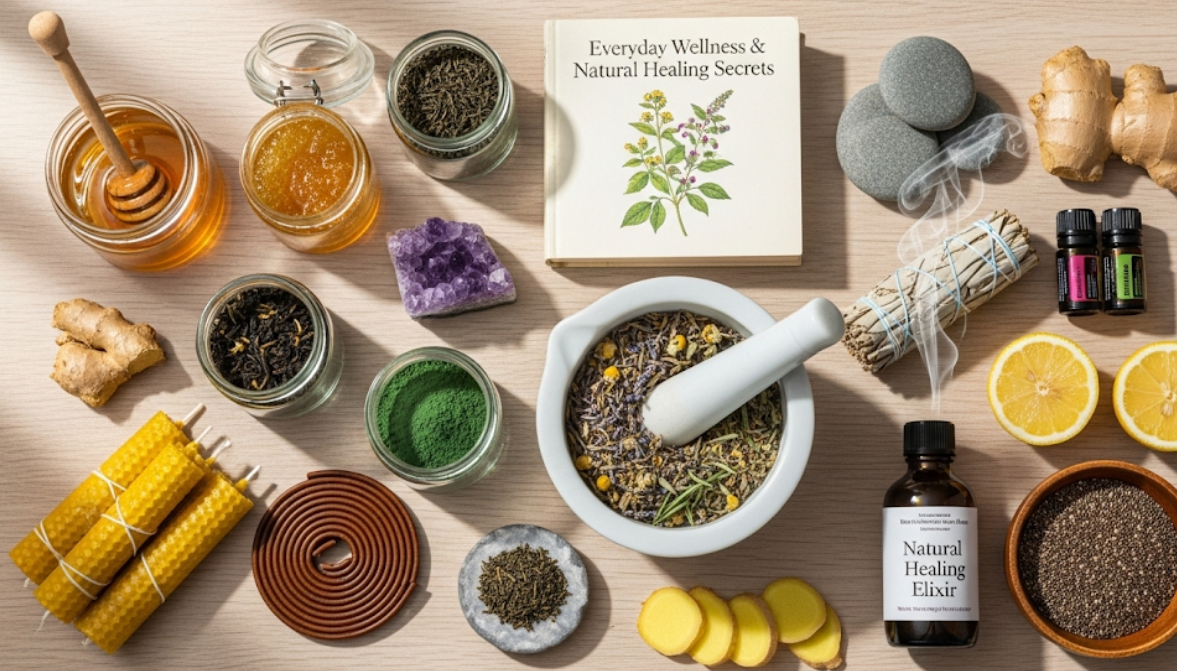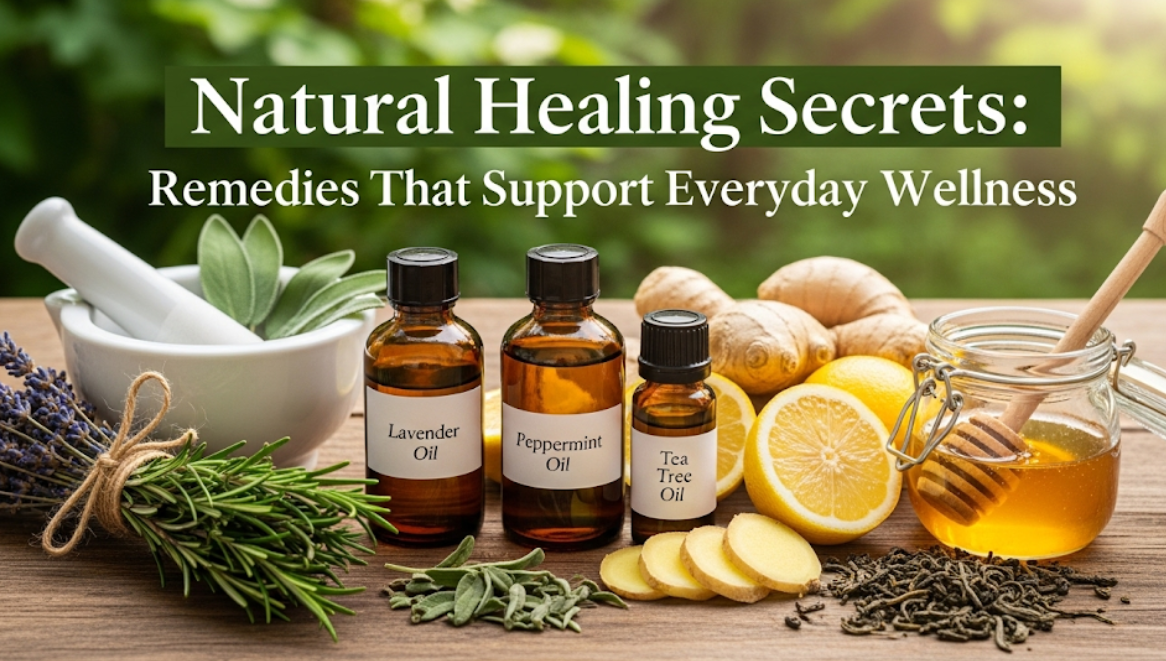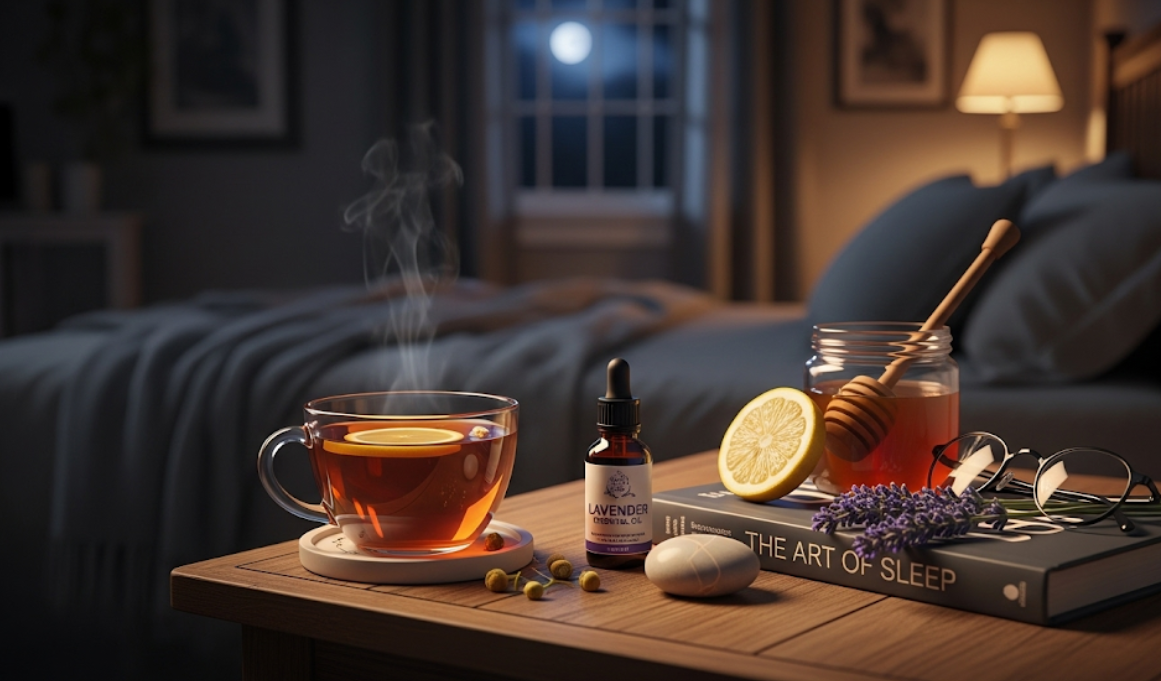Your body is a miraculous self-healing machine. For almost as long, humans have looked to nature’s pharmacy for a cure; from feeling better or staying healthy to being more energetic. These traditional remedies are no substitutes for modern medicine, but they can accompany them on your journey to wellness.
Natural remedies you already have in your home can be found from the spices that are sitting on your kitchen rack to the plants growing in your backyard. This guide will take you through easy, safe methods to access these life-giving secrets and incorporate them into your own routine.
The Mysteries That Surround Us: The Knowledge of the Ancients When It Comes to Natural Healing
Even before pharmacies were born, our ancestors used the most diverse types of plants, herbs and natural substances to treat problems from headaches to stomach ailments. Ancient traditional medical systems such as Ayurveda in India, Traditional Chinese Medicine and Native American plant medicine have handed down knowledge through the generations.
What makes these remedies special? They tend to work with your body’s natural processes rather than against them. Many of our drugs today were originally derived from plants, and researchers at the time probably synthesized them in a laboratory too. Aspirin was found in willow bark and digitalis heart medicine was created from foxglove flowers.
Nature’s remedies are gentle. And while they might not work as quickly as some of their synthetic counterparts, they also are more likely to have fewer side effects and provide benefits to your overall health in multiple ways.
Kitchen Cabinet Champions: Common Foods That Heal
Chances are your kitchen has more healing potential than you know of. These everyday foods contain some serious wellness benefits that can boost your health every day.
Ginger: The Digestive Dynamo
The gnarled root does more than just lend flavor to your cooking. Ginger contains gingerols, a group of compounds that may help calm nausea, settle stomachs and reduce inflammation. Store fresh ginger root in the refrigerator and experiment with it:
- Slice thin pieces into hot water for stomach-settling tea
- Put grated ginger in smoothies to aid digestion
- Chew a small piece after meals for gas and bloating
- Combine with honey for sore throat relief
Turmeric: The Golden Healer
This vibrant-yellow spice is home to curcumin, a potent compound that battles inflammation across your body. Inflammation is one of the root causes of hundreds of health issues, so turmeric functions as a mild, natural anti-inflammatory medication.
Experiment with blending a teaspoon of turmeric powder into warm milk along with a pinch of black pepper (which helps your body absorb the curcumin more effectively). This golden milk is an extremely calming before-bed drink to help your body get a restful, healing night’s sleep.
Garlic: Nature’s Antibiotic
Fresh garlic contains allicin, which some say can curb bacteria and viruses. Regular consumption of garlic may help to strengthen your immune system and maintain heart health. For optimal health benefits, crush or chop the garlic and allow it to be exposed to air for about 10 minutes prior to cooking in order to activate allicin.
Honey: Sweet Medicine
There’s more to raw honey than sweetness. It is full of enzymes and antioxidants, compounds that can soothe a persistent cough, heal small cuts fast, and deliver instant energy. The healing qualities of honey particularly affect wounds and digestive troubles, including Manuka honey from New Zealand.
Herbal Heroes for Daily Wellness
Concentrated healing compounds are found in herbs for targeted health issues. Here are a few gentle, universal picks that should be suitable for most people.
Chamomile: The Gentle Relaxer
This daisy-like flower is among the most popular herbs for tea in the world. Compounds found in chamomile calm down your nervous system, so it’s particularly good for:
- Reducing anxiety and stress
- Promoting better sleep quality
- Soothing upset stomachs
- Soothing irritated skin, when used in a wash
Before bed, reach for a cup of chamomile tea 30 minutes prior to sleep time for the greatest sleep-promoting benefits.
Peppermint: The Cooling Comforter
The cooling menthol in peppermint helps with a variety of issues. The herb can relax digestive muscles, clear sinuses and relieve headaches. Fresh peppermint leaves make excellent tea, or you can purchase peppermint essential oil for aromatherapy purposes.
Echinacea: The Immune Supporter
For centuries, this purple flower has been used to help keep the body’s immune system working at its optimal level. There’s some evidence that echinacea may shorten the duration and lessen the severity of common colds. To get the best results, take echinacea supplements or drink echinacea tea at the first sign of cold symptoms.
Lavender: The Stress Buster
It’s not just that it smells lovely for us: It actually has an impact on our brain chemistry, encouraging a state of relaxation. Draw a bath and pour in drops of lavender oil, sleep with a sachet under your pillow or use dried lavender flowers to brew tea.
Daily Living Wellness Tips: Everyday Rituals for a Healthy Body and Mind
Incorporating healing habits into your daily routine need not involve sweeping lifestyle changes. The power of being in green space, connecting the body with plant life and getting fresh air will really do a tremendous amount for mental health.
Morning Wellness Routine
Begin your day with activities that invigorate and shield your body:
Warm Lemon Water: Squeeze a half fresh lemon into warm water and drink first thing in the morning. This straightforward beverage can help to keep you hydrated, aid digestion and supply some vitamin C to help bolster your immune system.
Deep Breathing: Spend five minutes taking long, deep breaths. It triggers your body’s relaxation response, where stress hormones that impact your health all day long are managed.
Light Movement: Just doing some gentle stretching or taking a brief walk reminds your body to begin making energy and mood-boosting chemicals.
Evening Wind-Down Rituals
Your nighttime habits prepare for deep, restorative sleep.
Herbal Tea Time: Go with a calming tea such as chamomile, passionflower or lemon balm about an hour before bed.
Aromatherapy: Place essential oils such as lavender, clary sage or sandalwood in a diffuser or even dab them on your wrist with carrier oil.
Gratitude Practice: Every day, list three things for which you are grateful. This routine can elevate mood and lower stress hormones.
You may also like: 10 Best Foods to Strengthen Immunity
The Natural Prescription for Health: 20 Common Ailments and Their Drug-Free Remedies
Here are safe, low-risk methods of dealing with common health problems that everyone has to deal with.
Stress and Anxiety Relief
| Natural Remedy | How It Helps | How to Use |
|---|---|---|
| Ashwagandha | Lowers cortisol (stress hormone) levels | 300-500mg daily with food |
| Magnesium | Eases muscles and nervous system | Epsom salt baths or 200-400mg supplement |
| L-theanine | Calms but not sedating | 100-200mg, typically found in green tea |
| Passionflower | Relieves anxiety without sleepiness | Drink as tea or take as tincture |
Sleep Support
Restful sleep repairs the body and the mind. Here are some natural ways to help you get better quality sleep:
- Make a cooler, darker sleeping space
- Try blackout curtains or an eye mask
- Keep bedroom temperature between 65-68°F
- Take valerian root tea or supplements 30 minutes before bed
- Practice progressive muscle relaxation techniques
- Cut off screens 2 hours before bedtime
Digestive Health
Your gut is important to your whole body’s health. Support your digestive system with:
Fermented Foods: Yogurt, kefir, sauerkraut and kimchi have good bacteria to populate the gut.
High-fiber Foods: Fruits, vegetables and whole grains feed your good bacteria to help keep digestion healthy.
Digestive Teas: Fennel, ginger and peppermint teas can help alleviate bloating and indigestion during or after meals.
Mindful Eating: Avoid eating too quickly and chew thoroughly for better digestion.
Energy and Mental Clarity
The best natural energy boosters support natural body processes for creating energy, not through artificial stimulation:
B-Complex Vitamins: These vitamins aid in converting food into energy in the cells.
Green Tea: Contains a nicer, softer caffeine that’s balanced with L-theanine for calm energy and focus.
Iron: Foods such as spinach, lentils, and pumpkin seeds aid in maintaining your blood oxygen levels.
Rhodiola: This adaptogenic herb could help your body manage stress and preserve its energy.
The Beneficial Use of Essential Oils in Everyday Life
Essential oils are highly concentrated plant compounds that deliver therapeutic benefits when inhaled or absorbed through the skin. Here’s what to know about how they can be used safely and effectively.
Top Essential Oils for Beginners
Lavender: Use to slip into peaceful, serene and calm relaxation. Combine with carrier oil for topical application or add to bath water.
Peppermint: Great for mental clarity and headaches and combating bloating. Use lightly — a little dab will do.
Eucalyptus: Good for respiratory support and mental alertness. Combine with steam inhalation for relief from congestion.
Tea Tree: Antimicrobial so it works for skin problems and cleaning. Always dilute before skin application.
Safe Usage Guidelines
- NEVER apply them to skin without diluting them in carrier oil (coconut, jojoba or sweet almond oil are best)
- Sensitivity Test: Apply a dime-size amount to small area of the skin for 30 minutes
- Do not use oils near eyes or mucous membranes
- Some of these oils can cause photosensitivity; research before sun exposure
- Pregnant women may need to consult their doctor prior to using essential oils
Building Your Natural Medicine Cabinet
Having a well-stocked natural remedies collection doesn’t mean you have to spend loads of money on expensive specialty items. Start with these basics:
Essential Dried Herbs
- Chamomile (for tea and relaxation)
- Ginger root for digestive support
- Echinacea for immune support
- Peppermint for stomach or other cough and cold issues
Pantry Staples
- Raw honey as a wound salve for coughs
- Apple cider vinegar for digestion
- Coconut oil as carrier oil and natural moisturizer
- Epsom salts for soothing baths and muscle pain
Fresh Options to Keep on Hand
- Lemons – vitamin C, detox support
- Fresh ginger root
- Garlic – for immune and circulatory support
- Aloe Vera Plant – gel for burns and skin irritation
When to Seek Professional Guidance
Although natural options provide great support for daily well-being, you should know when it’s time to seek professional help.
Consult a Healthcare Provider When:
- Symptoms last longer than a few days
- You have chronic health conditions
- You are on medication (to prevent interaction)
- You’re pregnant or breastfeeding
- Symptoms worsen despite natural treatments
Finding Qualified Natural Health Practitioners:
- Licensed naturopathic doctors
- Certified herbalists
- Integrative medicine physicians
- Registered dietitians with herbal training
Including the Basics of Natural Healing in Your Life
The secret to natural healing that works is not about “perfection” but practice. Small, daily habits can have a more significant long-term effect than occasional but intense efforts.
Begin by selecting one or two remedies that resonate with you and cater to what’s on your mind for health now. Be sure to do them regularly for a few weeks in order to feel their impact. Once these are habit, you may then continue on to add other natural healing methods.
Bear in mind that natural healing is most effective when administered as one piece of a healthy overall lifestyle. Proper nutrition, consistent activity, sufficient sleep and stress reduction are the underlying factors that make herbs, supplements and other natural approaches most effective.
Creating Your Personal Wellness Plan
All bodies react differently to natural treatments. Things that work great for your friend might not be the greatest alternative for you. Observe the effect of your ongoing actions and your body’s response. If you feel any kind of strain, change the way in which you are approaching it.
Use a simple wellness log to track:
- What remedies you try and when
- What you feel before and after using them
- Any side effects or reactions not anticipated
- Changes in energy, sleep or mood over time
This information can guide you in recognizing patterns and learning what natural methods work best for your specific requirements.

The Science Behind Natural Healing
We are actually still proving many natural healing avenues even in today’s times. Active ingredients from herbs and foods that account for their therapeutic effects have been uncovered by scientists. For example:
- Turmeric’s curcumin has been shown to lower markers of inflammation in blood tests
- Ingredients naturally occurring in chamomile bind to the same brain receptors as drugs used to treat anxiety
- Allicin in garlic has been found to have antimicrobial effects in the lab
- The gingerols in ginger are believed to help decrease brain signals responsible for nausea
This research-based information doesn’t serve to devalue the wisdom of traditional use; rather, it serves us in understanding how and why such remedies are effective.
Seasonal Wellness Strategies
To get greater benefits out of your natural healing practices, attune them to seasonal changes.
Spring Detox Support
- Dandelion tea for liver support
- Fresh greens for cleansing nutrients
- Nettle tea to prepare for allergy season
Summer Energy and Protection
- Refreshing herbs such as mint and cucumber
- Calendula for sun-sensitive skin
- Electrolyte-rich coconut water for hydration
Fall Immune Preparation
- Elderberry syrup for immune support
- Warm spices, including cinnamon and cloves
- Throat-soothing propolis preparations
Winter Warmth and Comfort
- Warming teas made with ginger and cardamom
- Vitamin D support through diet and/or safe sun exposure
- Mood-supporting light therapy and aromatherapy
Natural health is a gentle & sustainable way to maintain your everyday wellness. Add these classic remedies to your routine each day to help the body maintain its very own balance and sturdiness. And, as always, listen to your body and consult with a knowledgeable professional. You have your own journey to natural wellness – enjoy the ride and find what is best for YOU!
Frequently Asked Questions
Are natural solutions safe for all people to use?
Natural treatments tend to be gentler than synthetic medications, but that doesn’t mean they’re automatically safe for everyone. Individuals with allergies, medical conditions and those on medications from their physician are recommended to seek healthcare provider advice before initiating new natural remedies. Pregnant and breastfeeding women should exercise special caution, as some herbs may impact hormone levels, or be transmitted through breast milk.
How long does it take for natural remedies to work?
Natural treatments tend to act more slowly than drug therapies; you may need to use them for several days to weeks before seeing desired effects. Some treatments such as peppermint for headaches, ginger for nausea and others may work within minutes whereas turmeric for inflammation or adaptogens to reduce stress will require regular use of 2-8 weeks to obtain good results.
Can I safely take natural remedies if I am using prescribed medications?
A lot of supplements can interact with prescriptions, rendering them less effective or increasing the amount of side effects. St. John’s wort, for instance, can interact with birth control pills and antidepressants. As a general rule, let your doctor or pharmacist know if you are using a natural remedy even if you do not think it will interact with your prescription. Learn about possible interactions between treatments before combining them.
What separates supplements from whole herbs?
Whole herbs contain many compounds that act synergistically, whereas supplements usually focus on one or more active ingredients. Most practitioners believe in whole herbs for a more balanced action, with fewer side effects, but supplements can contain a more concentrated standardized dose. Both could be good options for you, depending on your unique goals and health needs.
How can I tell if a natural remedy is good quality?
Seek products from trustworthy companies that provide third-party testing results, transparent ingredient lists and proper storage instructions. Buy organic when you can and store in a dark, cool place. Fresh herbs should be bright in color and fragrant. Essential oils should be in dark glass bottles and labeled with the botanical name and country of origin.
Are natural remedies safe for children to use?
Children’s bodies metabolize things differently than adults, so some of these natural remedies are not appropriate for young people. Safe bets for kids are chamomile tea for minor tummy complaints, honey for coughs (only for babies over 12 months), and mild aromatherapy. Always use a child’s dose and consult pediatricians before administering natural remedies to children.
What if I have an adverse reaction to a natural remedy?
Discontinue the remedy at once, maintain a daily diary of what you experienced and how severe they appeared to be as well as when. Call a doctor if symptoms are severe or concerning. Even if the reactions are mild, they may still be signs of allergies or sensitivities that could escalate with more use. It’s a good idea to note any reactions in order not to consume the troublesome substances again.
How should I store natural remedies?
Dried herbs and spices should be stored in cool, dark places (in airtight containers) away from moisture and sunlight. Essential oils must be stored in dark glass bottles in cool conditions. Fresh herbs may be refrigerated or frozen, and tinctures and extracts have shelf lives that depend on how they are stored. Toss products that are expired, check expiration dates on a regular basis and replace old products — the longer you hang onto them, their potency will decrease.
Is a more expensive natural remedy superior to a cheaper one?
Natural remedies aren’t necessarily quality-based when it comes to price. There may be some pricier products which are better sourced, processed or tested, but others could just have more expensive marketing involved. Don’t only look at price, also focus on aspects such as whether the brand is organically certified, third-party testing, proper packaging and more. Often, cheap and simple treatments, such as fresh ginger or honey, work just as well.
Can natural therapies or remedies replace all of my medications?
Natural treatments should not be used as a substitute for necessary medication that requires medical supervision. They can, at most, help support good overall health and perhaps reduce the necessary amount of some medications over time, but conditions like diabetes, high blood pressure or heart disease typically require medical management. Collaborate with your practitioner(s) in both conventional and natural medicine to develop the safest and most effective strategy for your circumstances.





